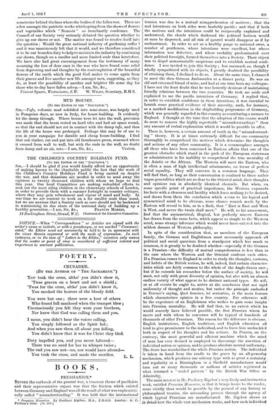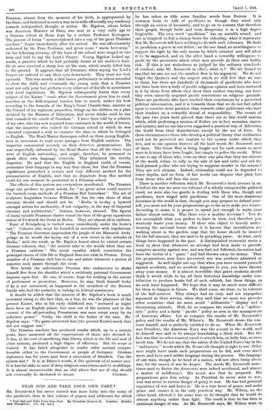BOOKS,
PRUSSIANISIAL* BEFORE the outbreak of the present war, a constant theme of pacificists and their representative organs was that the friction which existed between Germany and England was all the result of what was euphemisti- cally called "misunderstanding." It was held that the international
Prusajan memories. By pouituey Bigelow. MA., P.R.G.B. London: G. P. Putnanes Sons. [5i. net.1 tension was due to a mutual misapprehension of motives ; that the real intentions on both sides were laudably pacific ; and that if both the motives and the intentions could be reciprocally explained and understood, the clouds which darkened the political horizon would at once be dispersed. and all risk of quarrel would disappear as if by enchant-Merit. In order to act as a healthy purge to national error, a number of gentlemen, whose intentions were excellent, but whose information was defective, and whose credulity predominated over their political foresight, formed themselves into a Society. Their object was to dispel unwarrantable suspicions and to establish mutual confi- dence. I was invited to join this Society ; but inasmuch as, though I wholly sympathized with its objects, I greatly doubted the possibility of attaining them, I declined to do so. About the same time, I chanced to meet the then German Ambassador at a dinner party. He was an old and esteemed friend of mine, and had at one time been my colleague. I have not the least doubt that he was honestly desirous of maintaining friendly relations between the two countries. He took me aside and explained to me the pacific intentions of Germany. I replied that, in order to establish confidence in those intentions, it was essential to furnish some practical evidence of their sincerity, such, for instance, as a marked modification in the shipbuilding programme of Germany, which was generally regarded in this country as constituting a menace to "England. I thought at the time that the adoption of this course would do more to remove the highly regrettable " misunderstandings " than any amount of verbal explanation which it would be possible to offer. There is, however, a certain amount of truth in the " misunderstand- ing " theory. It is at times extremely difficult for one community thoroughly to comprehend the motives which determine the thoughts and actions of any other community. It is a commonplace amongst all those who have been concerned in Eastern affairs that one of the greatest obstacles which stand in the path of the European statesman or administrator is his inability to comprehend the true mentality of the Asiatic or the African. The Western will meet the Eastern, who is often a man of high intellectual attainments, on terms of perfect social equality. They will converse in a common language. They will find that, so long as their conversation is confined to those rather vague generalities which are so dear to the Oriental mind, their thoughts and opinions run in absolutely identical channels. But when, on some specific point of practical importance, the Western expounds his facts with a clearness and lucidity which leave nothing to be desired, and draws from them the conclusion which VMS to his logical andL symmetrical mind to be obvious, some chance remark made by the Eastern will reveal to him, as in a flash, that "East is East and West is West, and never the twain shall meet." He will, to his amazement,. find that the asymmetrical, illogical, but perfectly sincere Eastern has drawn from the same facts, which appear so simple to the Western mind, some strange inference which would never have entered into the wildest dreams of Western philosophy,
In spite of the consideration that, as members of the European family, the German and Englishman must necessarily approach all political and• social questions from a standpoint which has much in common, it is greatly to be doubted whether—especially if th3 German is a Prussian—the difficulty of mutual comprehension is less than in the case where the Western and the Oriental confront each other.
If a Prussian comes to England in order to study the thoughts, customs,. and habits of the British nation, he will, indeed, find certain character- istics which are fairly common to the whole of the Anglo-Saxon race ; but if he extends his researches below the surface of society, he will meet, not only with great diversity of opinion, but also with an almost. endless variety of what appear to be distinct national types. lie will, or at all events he ought to, arrive at the conclusion that not rigid
uniformity of thought and motive, but rather the principle embodied' in Terence's saying, Quot bomines, tot 8ententia4 is the main featuna which characterizes opinion in a free country. Far otherwise will ; be the experience of an Englishman who wishes to gain some insight ' into Prussian mentality. He will find that, to an extent which he would scarcely have believed possible, the first Prussian whom Jr meets and with whom he converses will be typical of hundreds of thousands of other Prussians; The reason for the difference is obvious. English institutions, English traditions, and English education all tend to give prominence to the individual, and to leave him unshackled both in respect of his thoughts and his actions. In Prussia, on the contrary, the most powerful and efficient machine which the mind of man has ever devised is employed to di,scourage the assertion of ' individual action or opinion, and to produce absolute mental uniformity. The State has standardized the whole Prussian nation. The individual is taken in hand from the cradle to the grave by an all-powerful mechanism, which produces one solitary type with as great a certainty and regularity as a Birmingham or a Sheffield manufacturer would turn out so many thousands or millions of articles registered in what istermed a "sealed pattern" by the British War Office or Admiralty; The main interest in Mr. Poultney Bigelow's very lively and instructive work, entitled Prussian Memories, is that it brings home to the reader, more vividly than would be possible by the perusal of any history or philosophical treatise, the astounding process through the agency of which typical Prussians are manufactured. Mr. Bigelow shows us in detail how the whole vast mechanism works, and how each individual
Prussian, almost from the moment of his birth, is appropriated by the State, and fashioned in such a way as to stifle effectually any tendency towards independent thought or action. Mr. Bigelow, whose father was American Minister at Paris, was sent at a very early age to a German school at Bonn kept by a certain Professor Kortegarn. The process of being "metamorphosed into a cog of the great Prussian machine" began immediately after his arrival. He was affectionately welcomed by tho Frau Professor, and given some "warm beer-soup." On the following evening. all the boys of the school were ranged in two lines and told to say the Lord's Prayer. Young Bigelow looked up- wards, a practice which he had probably learnt at his mother's knee. He at once received a sharp box on the ears, which nearly felled him to the ground. It appears that all Prussians when saying the Lord's Prayer arc ordered to cast their eyes downwards. They must not look upwards. This was merely a first lesson preliminary to others intended to show the child, and eventually the young man, that a Prussian must not only pray but perform every other act of his life in accordance with fixed regulations. Mr. Bigelow subsequently learnt that every subject of the Kaiser "read) what the Government gives him to read, marches as the drill-sergeant teaches him to march, makes his bow according to the formula of the King's Court Chamberlain, marries as the Colonel of his regiment prescribes, brings up his children on a plan dictated by the Minister of Education, and never thinks until he has first consulted the oracle of Potsdam." I have been told by a relative of my own, who has now acquired some eminence in the world of letters, that the inspector who visited the German school at which he was educated expressed a wish to examine the class to which he belonged in English. The Head-Master thereupon called on three young English- men in succession to read some passages from English authors. The inspector commented severely on their defective pronunciation. He was respectfully informed by the Head-Master that all the three boys were of English nationality, and might, therefore, be presumed to speak their own language correctly. This infuriated the worthy inspector. He said that the English in England could, of course, pronounce their language in any way they chose, but that the Prussian regulations prescribed a certain and very different method for the pronunciation of English, and that no departure from this method could for one moment be permitted in a Prussian school.
The effects of this system are everywhere manifested. The Prussian stage can produce no great actors, for "no great actor could survive the barrack-room methods of a Prussian Hof Intendant." The art of sculpture languishes because William II. has his own ideas of what statuary should and should not be. "Berlin is to-day a byword amongst artists for mediocrity, if not vulgarity, in the way of Imperial statuary and architecture." Statues, however, abound. The figures of many notable Prussians cluster round the base of the great equestrian statue of Frederick the Great at Berlin. They are almost all in uniform. " Kant of Konigsberg is tucked away immediately under the horse's tail." Colonies also must be founded in accordance with regulations. "The Prussian Governor approaches the jungle of the Bismarck Archi- pelago as he would the laying out of a new street in the suburbs of Berlin," with the result, as Mr. Bigelow found when he visited certain German colonies, that "the natives take to the woods when they see a Prussian uniform." The social equality which constitutes the principal charm of club life in England does not exist in Prussia. Every member of a Prussian club has to rise and salute whenever a person of superior rank passes through the room.
Woe betide the unfortunate Prussian who endeavours to shake himself free from the shackles which a ruthlessly paternal Government imposes upon him. He can, of course, hope for nothing in the nature of preferment or promotion. Moreover, he may think himself lucky if he is not ostracized, as happened to the members of the Bunsen family who had the audacity to indulge in Liberal sentiments.
It should be added that the interest of Mr. Bigelow's book is much increased owing to the fact that, as a boy, he was the playmate of the present Kaiser, who in his early childhood was "nurtured as might have been an English prince, but once out of the nursery and in the current of the all-pervading Prussianism was soon swept away by its seductive power." Verily, the child is the father of the man. Mr. Bigelow says : "No game interested him [the present Kaiser] much that did not suggest war."
The Prussian machine has produced results which, up to a certain point, have answered all the expectations of those who devised it. It has, at the cost of sacrificing that liberty which is the life and soul of other nations, produced a high degree of efficiency. But its scope is limited. It has failed altogether to render other nations compre- hensible either to the Government or people of Germany. German diplomacy has for years past been a succession of blunders. Can the system last ? It is, in Dante's words, A Die spiacente ed ai nemici snot. It is hateful alike to men of deep religious convictions and to worldling!. It is almost inconceivable that an idol whose feet are of clay should net eventually be shattered to Moms - CROMER.































 Previous page
Previous page